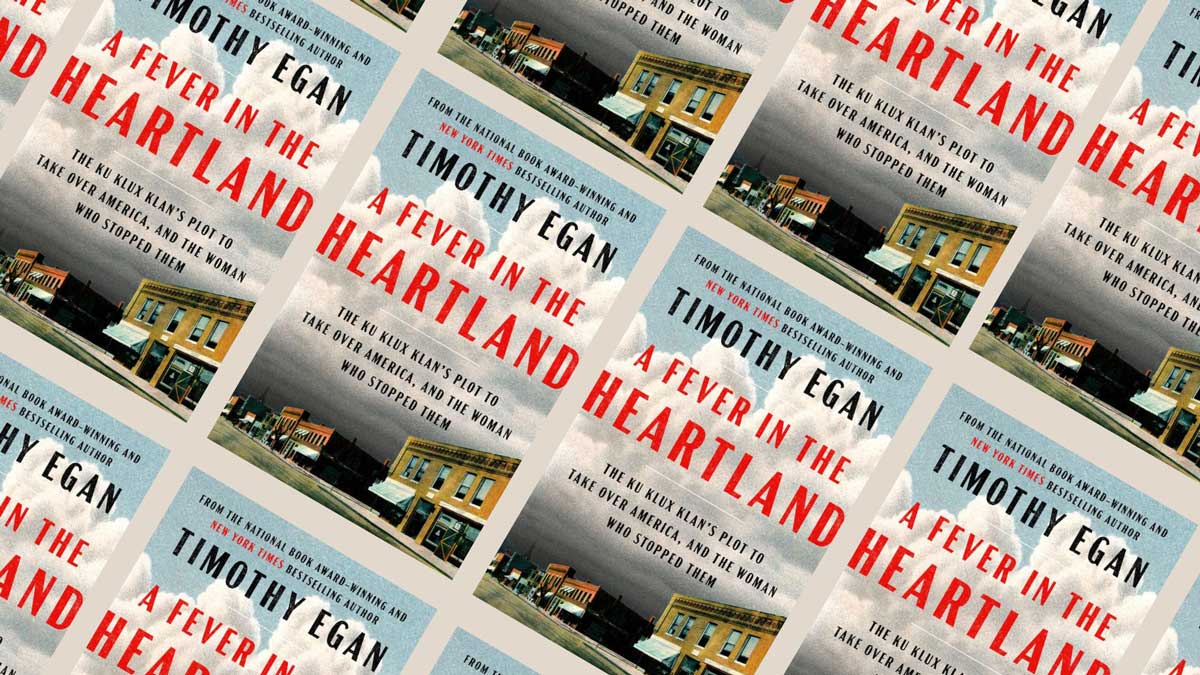The KKK and White Protestantism in Indiana
“The one duty we owe history is to rewrite it.” This quote by author Oscar Wilde struck me at the end of Timothy Egan’s book A Fever in the Heartland. Yet the reality is that we can’t rewrite a history we don’t know.
I recently finished this powerful book where Egan recounts the rise and fall of Indiana’s chapter of the Ku Klux Klan. It would be hard to miss the strong connections between the rise of the KKK and white Protestantism in Indiana. Throughout the book, I was struck by the churches and even clergy named who upheld and even blessed this homegrown terrorism and hatred. It hit close to home as I also read of how my own Methodist tradition deeply intertwined with the early development and continual sustainability of the Klan in Indiana.
The early days brought hooded Klansmen entering Methodist church doors, walking down the aisle, and presenting envelopes full of cash to the clergy; a tithe of sorts with the expectation of a full blessing. Egan recounts the story of Central Methodist Church in Evansville:
“The regular Sunday evening service was just getting underway in Evansville, Indiana, when the doors to Central Methodist Episcopal Church flung open with a bang. The minister was startled. The congregation gasped. A column of white-sheeted intruders, faces veiled but for cutouts over the eyes, marched forcefully up the aisle. The Reverent A. M. Couchman had seen these Kluxers around town for the last year, heard good things about them from fellow ministers, and noticed they had stitched red crosses in a circle over the heart on their robes. Under the vault of the church, the mystery men moved closer, surrounding the preacher and kneeling at his side. A gift was offered to him, an envelope stuffed with cash, “in the interest of the work you are doing here.” Then, just as quickly as they swept in, the Klansmen trooped out, filed into cars whose license plates had been covered and drove off into the mid-American twilight.”
This experience in Evansville gave future Klan leader in Indiana, D.C. Stephenson, the encouragement and inspiration he needed to find his way into the heart and soul of white Hoosier protestants. As Egan wrote, “The movement to the North was steeped in homegrown Christianity practiced by everyday folk. But instead of love your neighbor, these Klansmen hated many a neighbor.”
While the history of the connections between the Klan and Indiana Methodism is well known and documented, it was still appalling and disappointing to read of how many ministers, my ancestral colleagues, blessed this sort of hate by not only disregarding the direct commands of Jesus, but by completely blessing this homegrown terrorism against our black, Catholic, and Jewish siblings. It’s as if they ripped out the gospels of their bibles and burned them like the crosses that were burned across the state.
Perhaps it’s not a history we Hoosier Methodists like to own. It’s not something I’ve ever heard talked about freely, sweeping up history under the proverbial rug of forgotten racism. Yet this sad history remains across the state in faith communities. It’s even lived out in similar secretive and unspoken ways that feel eerily familiar to days gone by.
Becoming Anti-Racist
If Oscar Wilde was right in writing that “the one duty we owe history is to rewrite it,” then Indiana United Methodists have some rewriting to do. If there was ever a reason to be an anti-racist church, pastor, or layperson, it’s because history asks us to. Actually, Jesus asks us to. From rural communities to urban centers and everywhere in between, it’s time to rewrite our history with love, understanding, and anti-racism work that brings justice.
Perhaps it can begin with a book study on this book by Timothy Egan. There are many books that could be read and discussed. (Here is a small sampling: How to Be an Antiracist by Ibram X. Kendi, Me and White Supremacy by Layla Saad, Waking Up White by Debbie Irving, White Fragility by Robin Diangelo, How to Fight Racism by Jemar Tisby).
Wherever you begin, may it begin with a deeper desire to love God and love neighbor. Just think how powerful it would be if a church with our sort of history proclaimed today in prayer, word, and deed to be an antiracist church and the witness that would make across our state. Let’s begin rewriting our history today with love.
